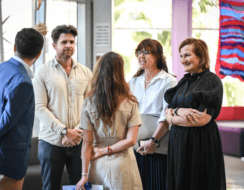14 May 2015
NewsSuccess story: John Mashar
{youtube}https://www.youtube.com/watch?v=mEZNtnWWhqc{/youtube}
When the northerners came into power, they introduced Sharia law into the country, which obviously conflicted with our beliefs and views in the south. A civil war broke out. There were a lot of tensions; it wasn’t safe for my family – my parents, my three siblings and me – to live in Sudan. My parents wanted to stay, but the government destroyed our home. That was the final straw, my father was like, ‘We need to go elsewhere’.
Because there were no UN bases in Sudan at the time, as displaced persons, we had three options of places to go: Kenya, Uganda or Egypt. We had a few relatives in Egypt so, in 1999, we moved to Egypt. We applied for a UN program, then we had to wait to see if we would be accepted into Canada, Australia or America.
In Egypt we lived with our relatives. It was very difficult because we had three families cramped into one unit. There were three rooms, so there was a family in each room. At least there were a lot of children around to play with. But, in general, Egypt was a very bad experience. It was worse than Sudan because there was a lot of discrimination towards black people and Christians.
In 2002, three years after arriving in Egypt, we were accepted by Australia. We’re very lucky. I know some people who’ve been living there for 10 years, just waiting. It was easier for my family’s paperwork to be processed because we were a ‘small’ family – six family members. A typical Sudanese household is very large, like, 11 people. And a lot of people lost their parents in the civil war so they’d usually be adopted by their uncle or their aunties; I know families where there were 14 kids. We were a small family, so we were easier to process.
I can’t explain the feeling of being granted visas by Australia. My mother was so happy. She almost fainted when the UN base in Egypt called to say, ‘Come in to collect your passports’. It was the best day of my mum’s life. We threw a party.
When we came to Australia, when I was about nine, it was refreshing. To even just step out at the airport and not be looked at differently because of our skin colour or anything, it was really great.
{youtube}https://www.youtube.com/watch?v=iw2zWkloVHE{/youtube}
As a child I was very playful and inquisitive, so I wanted to know everything, which made it easy for me to pick up English. I made a lot of friends at my school in Auburn. As for my parents, they were much older so it was more difficult for them. Plus, they were sceptical. Because in Egypt we weren’t really accepted, they were sceptical that that would happen here in Australia too.
I really liked Australia from the start. In particular I like the liberal ideals that promote equality and tolerance of people of different backgrounds and religions. And, most importantly, this whole idea of secularism – separating religion from state and government affairs.
For the first two to three years my parents found it difficult to find work, mainly because my father left school in year 8. So for the first two years we were on Centrelink. Then after completing her Cert III in English, my mother did certificates in childcare services, and in our third year she began working in childcare. My father did all sorts of jobs. At first I think he worked in a chicken factory. Then he did some labouring work.
I was asked to apply to be a member of the Youth Collective — a new initiative of SSI and migrant resource centres, to give multicultural youth a voice — by another member of the Youth Collective, who I knew through my involvement with Auburn Youth Centre.
What I like about the Youth Collective is that it involves people from a range of different organisations, backgrounds and areas. So we have young people who really understand the problems young people experience. Then we’ve got the guidance of the elders – the guidance of the elders and the energy of the youth.
One thing I’d really like to see the Youth Collective achieve is helping young people become employed. I’m employed at the moment; I work part-time at Kmart while I do full-time study at Macquarie Uni, studying Social Science. I previously did a Diploma in Marketing. My job is good, but it’s a temporary contract position, so soon I’ll be going back to looking for a job. I think youths need help with this type of thing: resume writing, interview questions and understanding the sorts of things expected by employers.
Unemployment is the root cause of a lot of young people’s other problems. When you’re younger, you can enjoy the simple things in life – you can go to the park and run around, but when you get older, you need money, to go out and socialise with friends. After a while there’s a lack of confidence because, you know, you don’t have the money to do the things you want. So we really have to tackle that issue.
I think multicultural youth need this sort of guidance even more because, growing up, I had to learn everything on my own. My parents gave me a lot of moral guidance, but they couldn’t tell me the ins and outs of everything because they were new here too. So I had to pick up everything along the way. And I picked up on some of the important things later than most of my peers who had that sort of guidance from their parents.”
YouTube: John Mashar talks about growing up in Australia as a young boy from Sudan.
YouTube: John Mashar talks about his hopes and goals for helping young people find employment.


